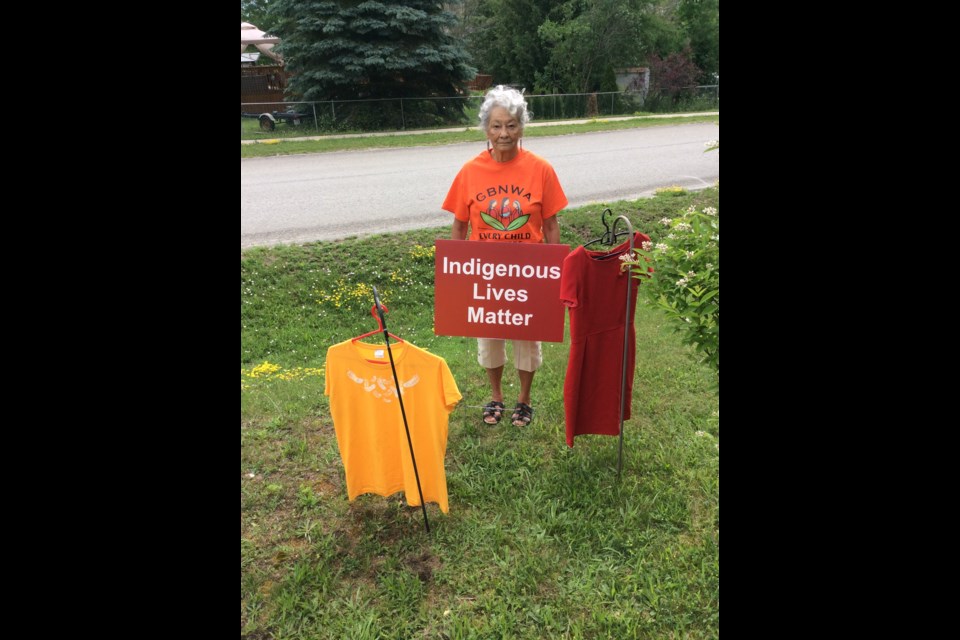Few things are as powerful as anger converted into positive action.
Lorraine Lacroix knows this well.
When the town of Midland ended the Sisters in Spirit Walk for Missing and Murdered Indigenous Women and Girls due to what Lacroix says were liability issues, she took matters into her own hands.
“It made me mad,” says Lacroix. “I decided that this wasn’t going to be swept under the carpet — not when we finally got the attention of the community and people around, I wanted to continue it.”
With the help of her friend Bonnie Sherriff, and the Georgian Bay Native Friendship Centre in Midland, Lacroix ensured that the Sisters in Spirit Walk continued to remember the more than 1,000 Indigenous Canadian women and girls who have been murdered or are missing.
Every year before Mother’s Day in May, Lacroix says, “we go around, and we hang the red dresses.
“We drum because these women are not going to see another Mothers’ Day,” Lacroix explains, “and the young girls are never going to have a chance to be mothers.”
Originally, Lacroix says that she invited anybody from the Friendship Centre who wanted to walk and drum, “because nobody can stop us from wearing our long skirts or walking along the street drumming.”
As part of the REDress project, the Friendship Centre, St. Paul’s United Church, Sainte Marie Among The Hurons and the Martyrs’ Shrine hang red dresses to raise awareness about Murdered and Missing Indigenous Women and Girls. Lacroix says that the Rosewood Centre and Georgian College get involved, and the Salvation Army donates some of the red dresses to name only a few of the local organizations that take part each year.
“That is something that I voluntarily did,” says Lacroix, who has volunteered at the Native Friendship Centre in Midland for 10 years.
Lacroix helps organize events at the centre, including making leather gloves out of hide, making tobacco ties and gathering sweetgrass.
Sweetgrass represents Mother Earth’s hair, and with 21 blades of grass separated into three groups of seven, the grass is braided to honour the seven generations to come. Sweetgrass is used in ceremonies, has healing elements, and can be used in smudging.
People get upset Lacroix says because they say they don’t know how to smudge.
“Smudge however you want,” says the great-grandmother. “Clear your mind, open your eyes and ears to hear and listen, and open your heart to get rid of the negativity. There’s no right way or wrong way. Whatever’s in your heart and makes you feel good. That’s what you do.”
Lacroix explains that she has also learned much in her time volunteering at the Native Friendship Centre.
“We are sharing. I volunteer to share knowledge, because we have forgotten some of these things — the traditional knowledge.”
At the centre, “you’re never criticized for what you do or don’t know. If they’re laughing, they’re laughing with you,” chuckles Lacroix.
For Lacroix, that makes the Native Friendship Centre a second home.
The proud Métis is careful to note that she “walks both worlds” because she is also Ojibway.
A few years ago, Lacroix had some trouble while attempting to use her Métis identification card as a form of ID at a local bank. This was another situation where her anger served her well. It helped her in connecting more with her past, her mother and her grandmother.
“Since then, I’ve verified my line,” says Lacroix explaining that she is a status Indian of from Henvey Inlet.
Lacroix says she wanted to verify her lineage to honour her mother and her grandmother who, like many Indigenous women, lost their rights “when European people said ‘you’re not Indian, because your father’s French-Canadian,’ although he was half-Indian and spoke Ojibway as his primary language,” says Lacroix. “That’s how history goes.”
Some time ago, while she was dealing with something personally trying, Lacroix approached the traditional healer at the Chigamik Community Health Centre for guidance. She asked the healer for her Anishinaabe name, and he called her Maang Kwe, or loon woman. The name is well chosen because of the mournful songs loons sing when searching for their mates, “because I’m always crying for my people,” says Lacroix.
Through the years of volunteering at the Native Friendship Centre Lacroix says she has learned as much about herself and her heritage as she has taught others.
“You have to love yourself first before you can love others,” she says, noting the centre helps with reconciliation. “It’s a welcoming, caring community. Whatever they have to share in, it’s all about community.”
The Georgian bay Native Friendship Centre is located at 175 Yonge Street in Midland and is open Monday through Friday from 9 a.m. to 4 p.m.



